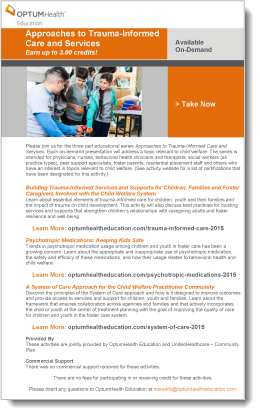TRICARE: Free CEUs for Healthcare Professionals
Recently, Rand Corporation published its 2014 Survey Ready to Serve: Community-Based Provider Capacity to Deliver Culturally Competent, Quality Mental Health Care to Veterans and Their Families. This survey was sponsored in part by the United Health Foundation and stated in part the following:
“Addressing the mental health needs of military service members, veterans, and their families is a national priority and the focus of many efforts at the federal, state, and local levels.1 Over the past decade, several studies have documented the extent of the need for mental health treatment among this population, and billions of dollars have been invested to expand the capacity of the systems designed to support veterans and their families at multiple levels and across sectors. …Based on our findings, it is reasonable to expect that increasing training in and incentivizing providers’ use of such techniques will begin to facilitate the delivery of high-quality care to veterans and their families. Improving the mental health of service members, veterans, and their families will require that the providers who treat them adopt and routinely use appropriate and effective approaches for addressing their conditions.”
In the spring of 2014, UnitedHealthcare Military and Veterans (UHC M&V), in collaboration with the TRICARE Regional Office-West, created a web page that serves as a single source for a variety of resources that support provider practice. These include links to the Defense Centers of Excellence (DCoE) which provides webinar courses twice a month on Traumatic Brain Injury (TBI), Post Traumatic Stress Disorder (PTSD) and related conditions. Providers will also find access to the National Intrepid Center of Excellence (NICoE) with articles on evidence-based practice (EBP) for integrated Medical/Behavioral care along with links to VA/DoD Practice Guidelines. Also located on this site, we provide access to mobile applications from the Center for Technology and Telehealth (T2) that can be used to support patient care, and also we have selected Condition Support articles from our Live and Work Well site that provide information and tools to enhance patient services and patient information.
In response to this Rand study, UHC M&V has now added links to a new series of web training that has been created by the Department of Veterans Affairs in cooperation with the Department of Defense (DoD) and presented by The Center for Deployment Psychology. There are four modules of the Military Culture: Core Competencies for Healthcare Professionals course that are listed below and have a total of 8 free CEU’s available.
Module 1: Self-Assessment and Introduction to Military Ethos - In this first module, you will be given the opportunity to reflect on your own beliefs and potential biases that might impact your work with Service members, Veterans, and family members. A conceptual framework for military culture will be introduced as the first step in increasing your knowledge about military ethos and its impact on psychological health and treatment. (2 hours)
Module 2: Military Organization and Roles - In this second module, the focus will be on the more visible or surface aspects of the military culture that can be observed “above the waterline”. You will gain an understanding of how some of the more material or tangible elements of the military such as its organizational structure, contracts, occupational roles, and customs function to reinforce military ethos and culture. In other words, while many of these visible aspects persist because of tradition, they all serve as visible manifestations of the underlying ethos. (2 hours)
Module 3: Stressors and Resources - This module focuses on the most common stressors in military culture and their impact on Service members and Veterans. You will learn about common stressors across different contexts and populations, stressors associated with the military deployment cycle from both a Service member and family member perspective, the most common reactions related to military life stressors, and some of the military support systems and services that have been developed in an attempt to offset stressors. (2 hours)
Module 4: Treatment, Resources, and Tools - This fourth module will focus on integrating what you’ve already learned about military culture into your assessment and treatment of health problems impacting Service members and Veterans. You’ll be given tools for assessing the impact of military culture on the health and well-being of your patients. You’ll be directed towards guidelines that incorporate elements of military culture for some of the health-related conditions that are most common in military populations. Finally, you’ll be given a self-assessment tool for military culture competence, and a checklist that incorporates the cultural vital signs you’ve seen throughout this course. (2 hours)
These courses are free and can be done online and at your pace when it is convenient for you. Please visit the Center for Deployment Psychology page on the TRICARE website.


